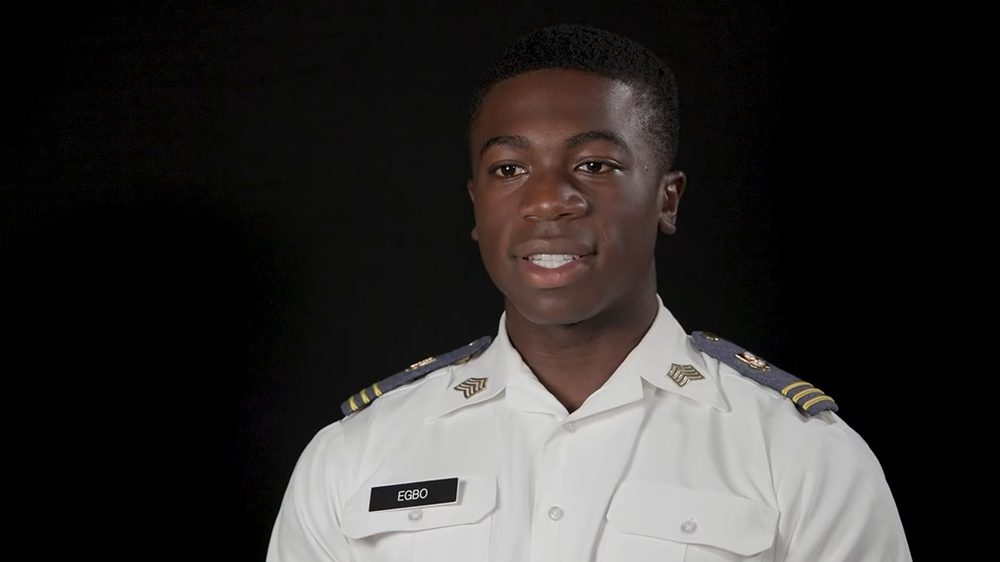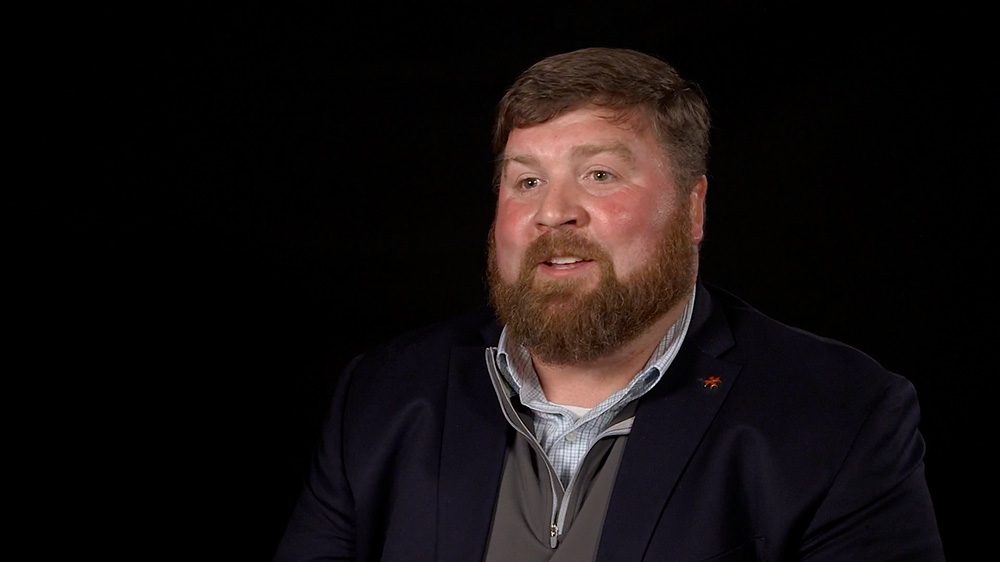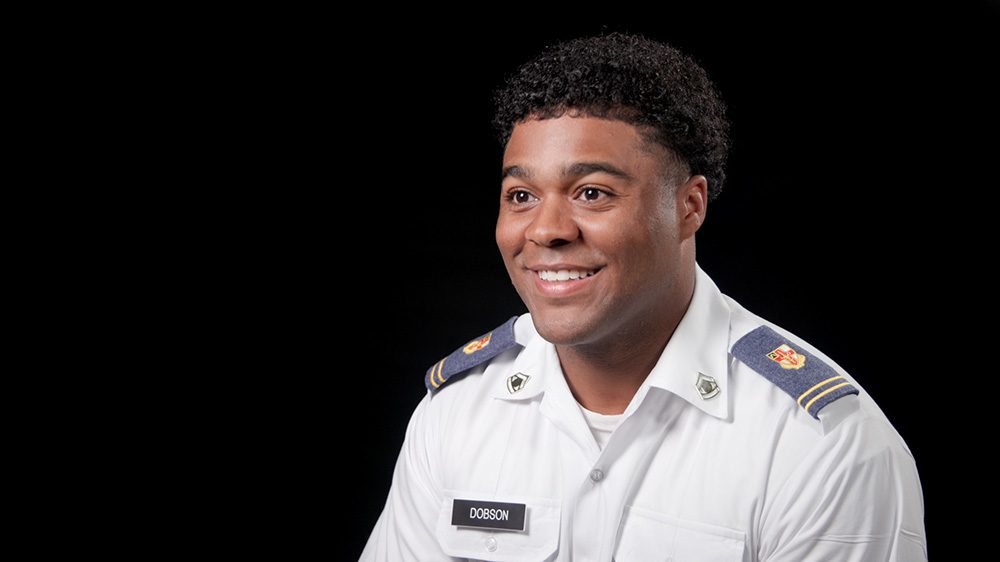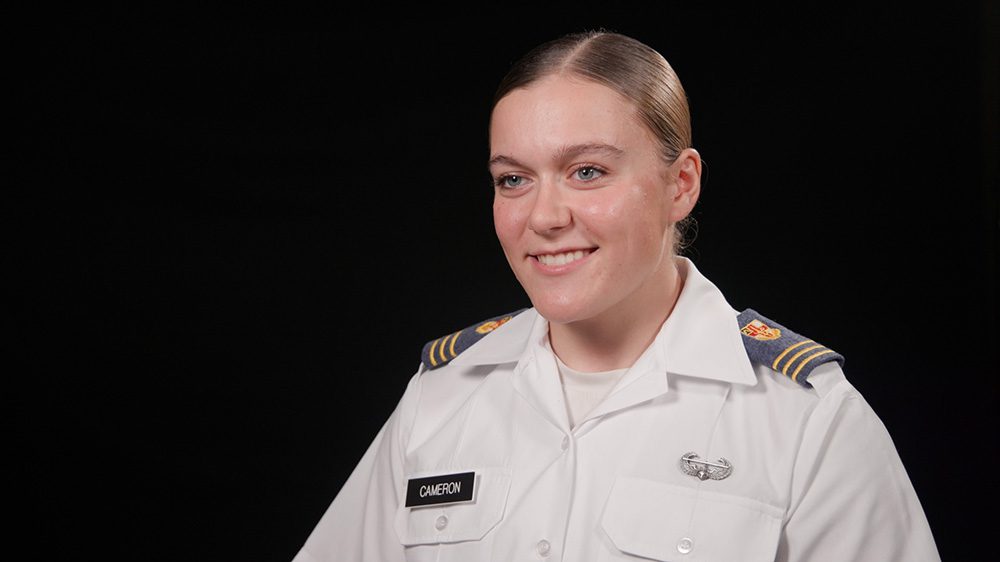“Just being held to a standard transformed me into the person I am today—always being held accountable for your actions, having to take ownership of your actions, your situation, and then the people that are around you, as well.” That’s what Cadet Joseph “Joe” Egbo ’23 has to say about how his experience at VMI has taken him from a high school student who wasn’t planning on attending college to regimental executive officer, the second-highest leadership position in the Corps of Cadets. It’s been an evolutionary process, one impacted by COVID-19, changing majors, and realizing that leadership doesn’t have to involve altering one’s personality.
Because his father is currently serving in the Army and his mother also served, Egbo had long planned a military career. At first, he thought he’d enlist straight out of high school, but his parents convinced him that commissioning as an officer would be a better option. A quick search for Virginia colleges with ROTC programs led Egbo to VMI, and after attending an open house, he applied early decision and was accepted.
Like every other rat, Egbo had moments of shock during the Rat Line, wondering what he’d gotten himself into. But he never wavered in the knowledge that he was in the right place. “I liked the system and what it was teaching me,” he commented. “And during the Rat Line, I really didn’t think, oh, man, do I have to do this to join the military? I was just thinking, this is one more step before I can join the military. And this is what I’ve got to do to become an officer.”
Around the same time, Egbo had a realization that’s sustained him ever since: “Being in an uncomfortable situation will only make that situation easier the next time you have to go through it.”
Just one month after Egbo and his brother rats had broken out of the Rat Line, VMI’s in-barracks academic year was cut short by COVID-19, and the entire Corps of Cadets was sent home to finish the year learning remotely. During that time, Egbo switched majors from electrical and computer engineering to applied mathematics—and wound up on academic probation, thus losing his rank as an S6 corporal. Eventually, his grades improved and he got his rank back, but this time, he was an S4 corporal dealing with logistics.
“We have not changed any of the core principles or the missions of VMI, the code of a cadet, the kind of things that are well respected in VMI graduates. So, we’re still trying to instill all of the things—all the positive things that you’re supposed to take out of this place—while making sure that we adapt to the ever-changing world around us.”
Cadet Joseph “Joe” Egbo ’23 Regimental Executive Officer
In his 2nd Class year, Ego served as an operations sergeant, overseeing guard duty, room standards, and uniform standards, among other duties. For his 1st Class year, he was chosen to be the regimental executive officer.
Typically, Egbo explained, the regimental executive officer is a cadet with a long history of cadre experience. He only had one year—and what’s more, his leadership style isn’t one of scowls and frowns.
“Honestly, I thought I had a very unorthodox style of being cadre,” he commented. “So, I like to smile. I’m a pretty fun guy, like to have fun, like to go with the flow kind of thing. But at the same time, I really like the military and discipline and things like that.”
As he stepped into the role of regimental executive officer—a role that involves direct oversight of the Rat Line—Egbo learned that a high level of leadership within the Corps didn’t mean he had to stop being himself.
He described it as “a switch I had to flip.” When teaching or correcting, he’d be serious, but later, he’d relax just a bit while maintaining his professional demeanor.
While some alumni think the Rat Line has weakened since they were cadets, Egbo has a different view—one that considers societal changes and an educational institution’s mission to prepare young people for the future. “[Cadre are] put in the position of having to evolve constantly to the society around us and what is accepted, and what’s actually going to prepare them for the world today,” he stated. “We have to find new ways of gaining the respect, of being able to instruct the Rat Mass and the people around us than just screaming and yelling all the time.”
At the same time, Egbo is careful to explain that while the methods of the Rat Line have been modified over time, the goals have remained the same.
“We have not changed any of the core principles or the missions of VMI, the code of a cadet, the kind of things that are well respected in VMI graduates,” he stated. “So, we’re still trying to instill all of the things—all the positive things that you’re supposed to take out of this place—while making sure that we adapt to the ever-changing world around us.”
As his cadetship draws to a close, Egbo is thankful for all the leadership opportunities he’s been given. “Everything you do at VMI is an opportunity for leadership,” he stated. “Peer leadership is some of the hardest leadership you’re going to encounter in your life.”
It’s the kind of background that Egbo believes will set him up well for his Army career and perhaps for a later career in the private sector. “I’ve grown so much since being a high school graduate to Rat Egbo to regimental XO Egbo,” he commented. “I’m 100% glad I came to VMI.”
-

Christian Heilman Director of Digital Content
The director of digital content is responsible for creating original video and multimedia materials, as well as developing and editing web and digital content. The director is responsible for platform coordination and troubleshooting, to include the VMI Alumni Agencies’ primary websites, digital newsletter and other digital platforms.

Mary Price Development Writer/Communications Specialist
The development writer plays a key role in producing advancement communications. This role imagines, creates, and produces a variety of written communication to inspire donors to make gifts benefiting VMI. Utilizing journalistic features and storytelling, the development writer will produce content for areas such as Annual Giving, stewardship, and gift planning.




